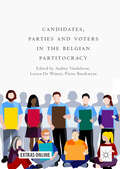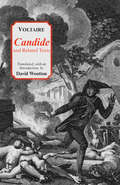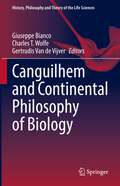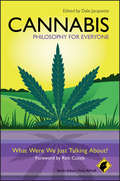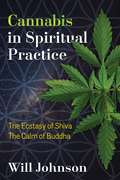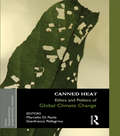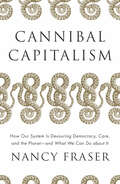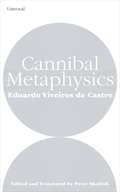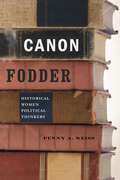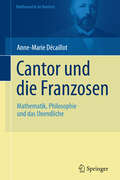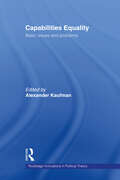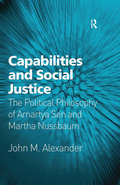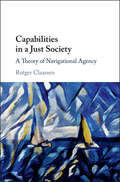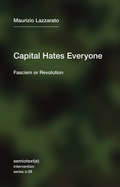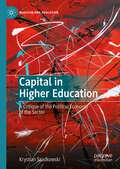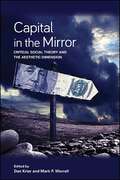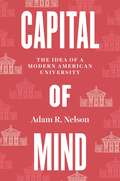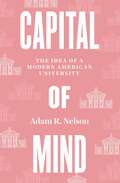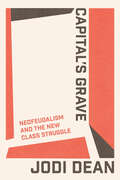- Table View
- List View
Candidates, Parties and Voters in the Belgian Partitocracy
by Audrey Vandeleene Lieven De Winter Pierre BaudewynsThis book focuses on the triadic relationship between electoral candidates and the two other poles of the delegation and accountability triangle—political parties and voters. The chapters rely mostly on the Belgian Candidate Survey (CCS project), gathering about 2000 candidates belonging to 15 parties represented in Parliament and running for the 2014 federal and regional elections, and the authors’ conclusions serve at answering broad political science questions linked with elite recruitment, party and candidate electoral strategies, personalisation, party cohesion, and descriptive and substantive representation. Its multilevel semi-open electoral system, atypical federal structure, extreme party system fragmentation and volatility make Belgium an exceptionally rich but complex case that offers findings highly relevant to research on candidates in other democracies.
Candide: and Related Texts
by Voltaire David WoottonDavid Wootton's scalpel-sharp translation of Candide features a brilliant Introduction, a map of Candide's travels, and a selection of those writings of Voltaire, Leibniz, Pope and Rousseau crucial for fully appreciating this eighteenth-century satiric masterpiece that even today retains its celebrated bite.
Canguilhem and Continental Philosophy of Biology (History, Philosophy and Theory of the Life Sciences #31)
by Charles T. Wolfe Giuseppe Bianco Gertrudis Van de VijverThis edited volume presents papers on this alternative philosophy of biology that could be called “continental philosophy of biology,” and the variety of positions and solutions that it has spawned. In doing so, it contributes to debates in the history and philosophy of science and the history of philosophy of science, as well as to the craving for ‘history’ and/or ‘theory’ in the theoretical biological disciplines. In addition, however, it also provides inspiration for a broader image of philosophy of biology, in which these traditional issues may have a place. The volume devotes specific attention to the work of Georges Canguilhem, which is central to this alternative tradition of “continental philosophy of biology”. This is the first collection on Georges Canguilhem and the Continental tradition in philosophy of biology. The book should be of interest to philosophers of biology, continental philosophers, historians of biology and those interested in broader traditions in philosophy of science.
Cannabis - Philosophy for Everyone
by Dale Jacquette Fritz Allhoff Rick CusickThe debate on the status and legality of cannabis continues to gain momentum. Here, personal anecdotes combined with academic and scientific reports combine to sharpen some of the fascinating philosophical issues associated with cannabis use. A frank, professionally informed and playful discussion of cannabis usage in relation to philosophical inquiry Considers the meaning of a 'high', the morality of smoking marijuana for pleasure, the slippery slope to more dangerous drugs, and the human drive to alter our consciousness Not only incorporates contributions from philosophers, psychologists, sociologists or legal, pharmacological, and medical experts, but also non-academics associated with the cultivation, distribution, and sale of cannabis Brings together an international team of writers from the United States, Canada, UK, Finland, Switzerland, South Africa, and New Zealand
Cannabis in Spiritual Practice: The Ecstasy of Shiva, the Calm of Buddha
by Will JohnsonAn exploration of the use of cannabis as a sacrament in spiritual practice • Provides instructions for using marijuana for the spiritual practices of spontaneous movement, ecstatic dance, sitting meditation, and gazing meditation, allowing you to open the body’s energies more fully and get closer to the Divine or your higher self • Includes a new translation of the Five Moral Precepts of Buddhism, adapted to include energetic practices and the judicious use of entheogenic substances as a legitimate support for spiritual growth • Includes access to 9 audio meditations With the end of marijuana prohibition on the horizon, people are now openly seeking a spiritual path that embraces the benefits of cannabis. Drawing upon his decades of experience as a teacher of Buddhism, breathing, yoga, and embodied spirituality, Will Johnson examines Eastern spiritual perspectives on marijuana and offers specific guidelines and exercises for integrating cannabis into spiritual practice. The author explains how the great Hindu god Shiva enjoyed consuming bhang, a marijuana mixture that would cause his body to make spontaneous movements. From these cannabis-inspired movements, Shiva brought the body-focused practices of dance and yoga to the world. Examining the spiritual path of Shiva, including the Sadhu tradition, Johnson provides specific instructions and protocols for using marijuana as a sacrament as Shiva did. He explores how to embrace cannabis for the practices of spontaneous movement, ecstatic dance, sitting meditation, and gazing meditation. He reveals how the ecstatic surrender to the feeling energies of the body in these practices is enhanced through the ingestion of Shiva’s herb, allowing you to open the body’s energies more fully and get closer to the Divine or your higher self. Exploring the Buddhist practices of calming the mind and grounding yourself in sensory awareness, Johnson shows that, while traditional Buddhist teachings forbid the use of intoxicating substances, Buddhists who use cannabis are not committing a cardinal sin--in following our dharma, we must embrace what best supports our spiritual practice. He concludes with a new translation of the Five Moral Precepts of Buddhism--what he calls the Five Precepts of Embodied Responsibility--adapted to include energetic practices using breath, interaction with the energies of nature, sacred sex, and the judicious use of entheogenic substances, such as cannabis, as legitimate support for spiritual growth.
Canned Heat: Ethics and Politics of Global Climate Change (Ethics, Human Rights and Global Political Thought #6)
by Marcello Di Paola Gianfranco PellegrinoClimate change is a key challenge in the contemporary world. This volume studies climate change through many lenses: politics, law, ethics, philosophy, religion, and contemporary art and culture. The essays explore alternatives for sustainable development and highlight oft-overlooked issues, such as climate change refugees and food justice. Designed as four parts, the volume: first, offers an astute diagnosis of the political and moral intricacies of climate change; second, deals specifically with topics in the political theory of climate change governance; third, focuses on the moral theory of climate change; and, finally, analyzes the specific ramifications of the climate change problem. With contributions from experts across the world, this will be especially useful to scholars and students of climate change studies, development studies, environmental studies, politics, and ethics and philosophy. It will also interest policy-makers, social activists, governmental and non-governmental agencies, and those in media and journalism.
Cannibal Capitalism: How our System is Devouring Democracy, Care, and the Planetand What We Can Do About It
by Nancy FraserA trenchant look at contemporary capitalism&’s insatiable appetite—and a rallying cry for everyone who wants to stop it from devouring our world Capital is currently cannibalizing every sphere of life–guzzling wealth from nature and racialized populations, sucking up our ability to care for each other, and gutting the practice of politics. In this tightly argued and urgent volume, leading Marxist feminist theorist Nancy Fraser charts the voracious appetite of capital, tracking it from crisis point to crisis point, from ecological devastation to the collapse of democracy, from racial violence to the devaluing of care work. These crisis points all come to a head in Covid-19, which Fraser argues can help us envision the resistance we need to end the feeding frenzy. What we need, she argues, is a wide-ranging socialist movement that can recognize the rapaciousness of capital—and starve it to death.
Cannibal Metaphysics (Univocal)
by Eduardo Viveiros de CastroThe iconoclastic Brazilian anthropologist and theoretician Eduardo Viveiros de Castro, well known in his discipline for helping initiate its &“ontological turn,&” offers a vision of anthropology as &“the practice of the permanent decolonization of thought.&” After showing that Amazonian and other Amerindian groups inhabit a radically different conceptual universe than ours—in which nature and culture, human and nonhuman, subject and object are conceived in terms that reverse our own—he presents the case for anthropology as the study of such &“other&” metaphysical schemes, and as the corresponding critique of the concepts imposed on them by the human sciences. Along the way, he spells out the consequences of this anthropology for thinking in general via a major reassessment of the work of Claude Lévi-Strauss, arguments for the continued relevance of Deleuze and Guattari, dialogues with the work of Philippe Descola, Bruno Latour, and Marilyn Strathern, and inventive treatments of problems of ontology, translation, and transformation. Bold, unexpected, and profound, Cannibal Metaphysics is one of the chief works marking anthropology&’s current return to the theoretical center stage.
Canon Controversies in Political Thought: Two Theories of Influence
by Dominic WelburnThis book explores the meaning of 'influence', which has played a central role in the formation of the canon, or tradition, of Western political thought. Via a critical overview of the relative fortunes of influence studies in the history of political thought, literary theory, and – at times – the history of art and poetry, it is possible to identify a dominant theory of the term. Nietzschean and ‘emanational’ in nature, thanks largely to the work of Harold Bloom, this particular theory views influence as mere power and represents a broadly accepted meaning in twentieth century thought. Canons or traditions of thought came to be institutions in themselves reflecting prevalent social and political inequalities. To be sure, a theory of influence as power came to be seen as complicit in arbitrary canon formation, across a range of disciplines. The book argues, ultimately, that a second theory of influence, imported from Mary Orr’s work on intertextuality, affords a rival perspective and a more positive, intergenerational meaning of influence. Orr’s ‘braided rope’ theory of influence allows for the development of a plurality of canons each capable of constructing new histories for a variety of epistemic communities. The existence of agonistic, rival canons presents pedagogical questions for all teachers of political theory, but one that can be potentially navigated by a new understanding of influence, in the Orrian tradition.
Canon Fodder: Historical Women Political Thinkers
by Penny A. WeissThis book is an exercise in the recovery of historical memory about a set of thinkers who have been forgotten or purposely ignored and, as a result, never made it into the canon of Western political philosophy. Penny Weiss calls them “canon fodder,” recalling the fate of soldiers in war who are treated by their governments and military leaders as expendable. Despite some real progress at recovery over the past few decades, and the now-frequent references to a few female thinkers like Mary Wollstonecraft, Hannah Arendt, and Simone de Beauvoir, the surface has only been scratched, and the rich resources of women’s writings about political ideas remain still largely untapped. Included here, and intended to further whet the palate, are figures from Sei Shōnagon, Christine de Pizan, and Mary Astell to Elizabeth Cady Stanton, Anna Julia Cooper, and Emma Goldman. Restoring female thinkers to the conversation of political philosophy is the primary goal of this book. Part I deploys a range of these thinkers to discuss the nature of political inquiry itself. Part II focuses on alternative approaches to and visions of core political ideas: equality, power, revolution, childhood, and community. While mainly an intellectual act of revival, this book also affects practical political life, because “remote and academic as they sometimes appear, debates about what to include in the canon ultimately touch almost everyone: students handed texts from lists of ‘great books’ to guide them . . . and citizens whose governments justify their actions with ideas from political texts deemed classic."
Cantor und die Franzosen: Mathematik, Philosophie und das Unendliche (Mathematik im Kontext)
by Anne-Marie Décaillot Klaus VolkertEnde des 19. Jahrhunderts, als Georg Cantor in Halle die Mengenlehre entwickelte, korrespondierte der Mathematiker lebhaft mit zahlreichen französischen Fachkollegen. Diese Briefe nimmt die Autorin zur Grundlage, um im Detail zu beschreiben, wie die Briefpartner um mathematische Begriffe gerungen haben. Eingebettet in den historischen Kontext wird so ein faszinierender Moment in der Geschichte der Mathematik wieder lebendig.
Capabilities Equality: Basic Issues and Problems (Routledge Innovations in Political Theory)
by Alexander KaufmanThe capabilities approach to equality, developed by Amartyr Sen and Martha Nussbaum, seeks to answer the question: what is a proper measure of a person's condition for the purposes of determining what we owe each other, as a matter of justice? While the capabilities theory has avoided many of the conceptual difficulties that have undermined competing accounts of egalitarian justice, recent criticisms have raised questions regarding the focus, structure and justification of the theory. In this volume, leading scholars present new and original essays that address these controversies.
Capabilities and Social Justice: The Political Philosophy of Amartya Sen and Martha Nussbaum
by John M. AlexanderThe capability approach to social justice construes a person's well-being in terms of the substantive freedoms people value. John Alexander engages with the rapidly growing body of literature on the capability approach in economics, inequality, poverty measurement and development studies. Critically assessing Sen and Nussbaum's work in normative economics, social ethics and political philosophy, Alexander develops a unified vision of the capability approach embodying the ideal of creating the greatest possible condition for the realization of basic capabilities for all. He then assesses this vision as a political theory arguing that capabilities are necessary but not sufficient for overcoming conditions of domination. The book calls for a more intimate relationship between individual liberty and the freedom of the political community as a whole.
Capabilities in a Just Society: A Theory of Navigational Agency
by Rutger ClaassenWhat sort of entitlements should citizens have in a just society? In this book, Rutger Claassen sets out a theory of what he terms 'navigational agency', whereby citizens should be able to navigate freely between social practices. This shows how individuals can be at the same time free and autonomous in striving for their own goals in life, but also embedded in social practices in which they have to cooperate with others. He argues that for navigational agency, people need three sets of core capabilities: those which allow human empowerment in civil society, a decent level of socio-economic subsistence, and political participation in democratic decision-making procedures. The idea of navigational agency, the book argues, provides an alternative to currently dominant versions of the capability approach to social justice, and strengthens its liberal foundations.
Capital Hates Everyone: Fascism or Revolution (Semiotext(e) / Intervention Series)
by Maurizio LazzaratoWhy we must reject the illusory consolations of technology and choose revolution over fascism.We are living in apocalyptic times. In Capital Hates Everyone, famed sociologist Maurice Lazzarato points to a stark choice emerging from the magma of today's world events: fascism or revolution. Fascism now drives the course of democracies as they grow less and less liberal and increasingly subject to the law of capital. Since the 1970s, Lazzarato writes, capital has entered a logic of war. It has become, by the power conferred on it by financialization, a political force intent on destruction. Lazzarato urges us to reject the illusory consolations of a technology-abetted "new" kind of capitalism and choose revolution over fascism.
Capital in Higher Education: A Critique of the Political Economy of the Sector (Marxism and Education)
by Krystian SzadkowskiThis book offers a systematic, sectoral, and in-depth Marxist perspective on the critique of political economy of higher education. It proposes an original method of analysis of higher education as a field of capitalist production, grounded at the intersection of mainstream higher education research and contemporary debates in Marxist theories. At the same time, it imbues a political perspective based on the embedding of higher education within the wider social network of antagonistic relations that traverse the capitalist economy at large.
Capital in the Mirror: Critical Social Theory and the Aesthetic Dimension (SUNY series in New Political Science)
by Dan Krier; Mark P. WorrellAesthetic objects, crafted as poetic reflections of the contradictory worlds that they inhabit, are simultaneously theorized and theorizing. In Capital in the Mirror, eminent critical theorists explore the aesthetic dimension for reflective visions of capital that are difficult to obtain through even the most rigorous statistical analyses. Chapters address inequality, alienation, ideology, warfare, and other problems of contemporary capitalism through the cultural prisms of Herman Melville, Thomas Mann, Charles Dickens, J. W. Goethe, Friedrich Hölderlin, Walt Whitman, Bertolt Brecht, and science-fiction cinema. Famous narrative elements in their works, such as Ahab's pursuit of the white whale in Melville's Moby-Dick, demonic production and perverse desire in Mann's Doctor Faustus, socially electrified bodies of Whitman's Leaves of Grass, and dystopian projections of current sci-fi cinema, are theorized as stylistically distorted reflections of social life within capital. The authors reveal theoretical powers latent within these condensed images that prefigure the dark dynamics of capitalism. Focusing on dark images of domination and also prophetic images of transformation, the book points the way toward emancipation, social regeneration, and human flourishing.
Capital is Dead: Is This Something Worse?
by McKenzie WarkIt's not capitalism, it's not neoliberalism - what if it's something worse?In this radical and visionary new book, McKenzie Wark argues that the all-pervasive presence of data in our networked society has given rise to a new mode of production, one not ruled over by capitalists and their factories but by those who own and control the flows of information. Yet, if this is not capitalism anymore, could it be something worse? What if the world we're living in is more dystopian than the techno utopias of the Silicon Valley imagination? And, if this is the case, how do we find a way out? Capital is Dead offers not only the theoretical tools to analyse this new world of information, but also to change it.A follow-up to her groundbreaking A Hacker Manifesto, Wark takes us on a tour of our information age. Drawing on the writings of the Situationists and a range of contemporary theorists, Capital is Dead offers a vast panorama of the contemporary condition and the classes that control it.
Capital of Mind: The Idea of a Modern American University
by Adam R. NelsonThe second volume of an ambitious new economic history of American higher education. Capital of Mind is the second volume in a breathtakingly ambitious new economic history of American higher education. Picking up from the first volume, Exchange of Ideas, Adam R. Nelson looks at the early decades of the nineteenth century, explaining how the idea of the modern university arose from a set of institutional and ideological reforms designed to foster the mass production and mass consumption of knowledge. This “industrialization of ideas” mirrored the industrialization of the American economy and catered to the demands of a new industrial middle class for practical and professional education. From Harvard in the north to the University of Virginia in the south, new experiments with the idea of a university elicited intense debate about the role of scholarship in national development and international competition, and whether higher education should be supported by public funds, especially in periods of fiscal austerity. The history of capitalism and the history of the university, Nelson reveals, are intimately intertwined—which raises a host of important questions that remain salient today. How do we understand knowledge and education as commercial goods? Should they be public or private? Who should pay for them? And, fundamentally, what is the optimal system of higher education for a capitalist democracy?
Capital of Mind: The Idea of a Modern American University
by Adam R. NelsonThe second volume of an ambitious new economic history of American higher education.Capital of Mind is the second volume in a breathtakingly ambitious new economic history of American higher education. Picking up from the first volume, Exchange of Ideas, Adam R. Nelson looks at the early decades of the nineteenth century, explaining how the idea of the modern university arose from a set of institutional and ideological reforms designed to foster the mass production and mass consumption of knowledge. This “industrialization of ideas” mirrored the industrialization of the American economy and catered to the demands of a new industrial middle class for practical and professional education. From Harvard in the north to the University of Virginia in the south, new experiments with the idea of a university elicited intense debate about the role of scholarship in national development and international competition, and whether higher education should be supported by public funds, especially in periods of fiscal austerity. The history of capitalism and the history of the university, Nelson reveals, are intimately intertwined—which raises a host of important questions that remain salient today. How do we understand knowledge and education as commercial goods? Should they be public or private? Who should pay for them? And, fundamentally, what is the optimal system of higher education for a capitalist democracy?
Capital's Grave: Neofeudalism and the New Class Struggle
by Jodi DeanThe fact that communism did not prevail does not mean we are still in capitalism. Capitalist relations are undergoing systemic transformation and becoming something that might even be worse.Bringing together analyses from different fields—law, technology, Marxism, and psychoanalysis—Jodi Dean shows the direction the contemporary world is heading: neofeudalism. Feudalism isn&’t just a metaphor. It&’s the operating system for the present. Politics and plunder thrive in the capitalist pursuit of profit, and the many are bound to serve the few, coerced into a system of rents, destruction, and hoarding driven by privilege and dependence.The question is: In a society of serfs and servants, how do we get free?With the rise of neofeudalism, and as more and more workers are drawn into the service sector—from nurses to Uber and delivery drivers—Dean argues that we can see the emergence of a new vanguard, the class that can lead the struggle for liberation from oppression and exploitation: what she calls the servant vanguard.
Capital: Volume I (Capital #1)
by Karl Marx'A groundbreaking work of economic analysis. It is also a literary masterpice' Francis Wheen, GuardianOne of the most notorious and influential works of modern times, Capital is an incisive critique of private property and the social relations it generates. Living in exile in England, where this work was largely written, Marx drew on a wide-ranging knowledge of its society to support his analysis. Arguing that capitalism would cause an ever-increasing division in wealth and welfare, he predicted its abolition and replacement by a system with common ownership of the means of production. Capital rapidly acquired readership throughout the world, to become a work described by Marx's collaborator Friedrich Engels as 'the Bible of the working class'.Translated by BEN FOWKES with an Introduction by ERNEST MANDEL
Capital: Volume II (Capital #2)
by Karl MarxThe "forgotten" second volume of Capital, Marx's world-shaking analysis of economics, politics, and history, contains the vital discussion of commodity, the cornerstone to Marx's theories.
Capital: Volume III (Capital #3)
by Karl MarxUnfinished at the time of Marx's death in 1883 and first published with a preface by Frederick Engels in 1894, the third volume of Das Kapital strove to combine the theories and concepts of the two previous volumes in order to prove conclusively that capitalism is inherently unworkable as a permanent system for society. Here, Marx asserts controversially that - regardless of the efforts of individual capitalists, public authorities or even generous philanthropists - any market economy is inevitably doomed to endure a series of worsening, explosive crises leading finally to complete collapse. But healso offers an inspirational and compelling prediction: that the end of capitalism will culminate, ultimately, in the birth of a far greater form of society.
Capitalism Hates You: Marxism and the New Horror Film
by Joshua GoochWhat contemporary horror films teach us about the cruelties of capitalist societyCapitalism Hates You uses the horror film genre as a tool to diagnose and expose the hostile conditions of life under capitalism. Through incisive critical analyses of popular films such as Get Out, Drag Me to Hell, Hereditary, The Babadook, and many others, Joshua Gooch draws connections between Marxist theory and contemporary narratives of psychological unease. Gooch highlights the work of women, trans, and nonwhite filmmakers to show how the remarkable diversity of twenty-first-century horror cinema can provide an expansive catalog of capitalism&’s varying forms of oppression. Studying films that interrogate such urgent topics as gentrification, climate change, and reproductive labor, he demonstrates how contemporary horror films give affective shape to the negative undercurrents of our present socioeconomic system. Capitalism Hates You argues that these films and their material conditions can deepen our understanding of essential concepts in contemporary Marxism, from the theory of value and changing forms of commodification to the labor of social reproduction, the abolition of the family, and the necessity of ecosocialism. Synthesizing various strands of Marxist thought, Gooch sheds light on the growing field of socially conscious horror films, examining how they pinpoint and exaggerate latent feelings of dread and discomfort to reflect the ills of society. Retail e-book files for this title are screen-reader friendly with images accompanied by short alt text and/or extended descriptions.
